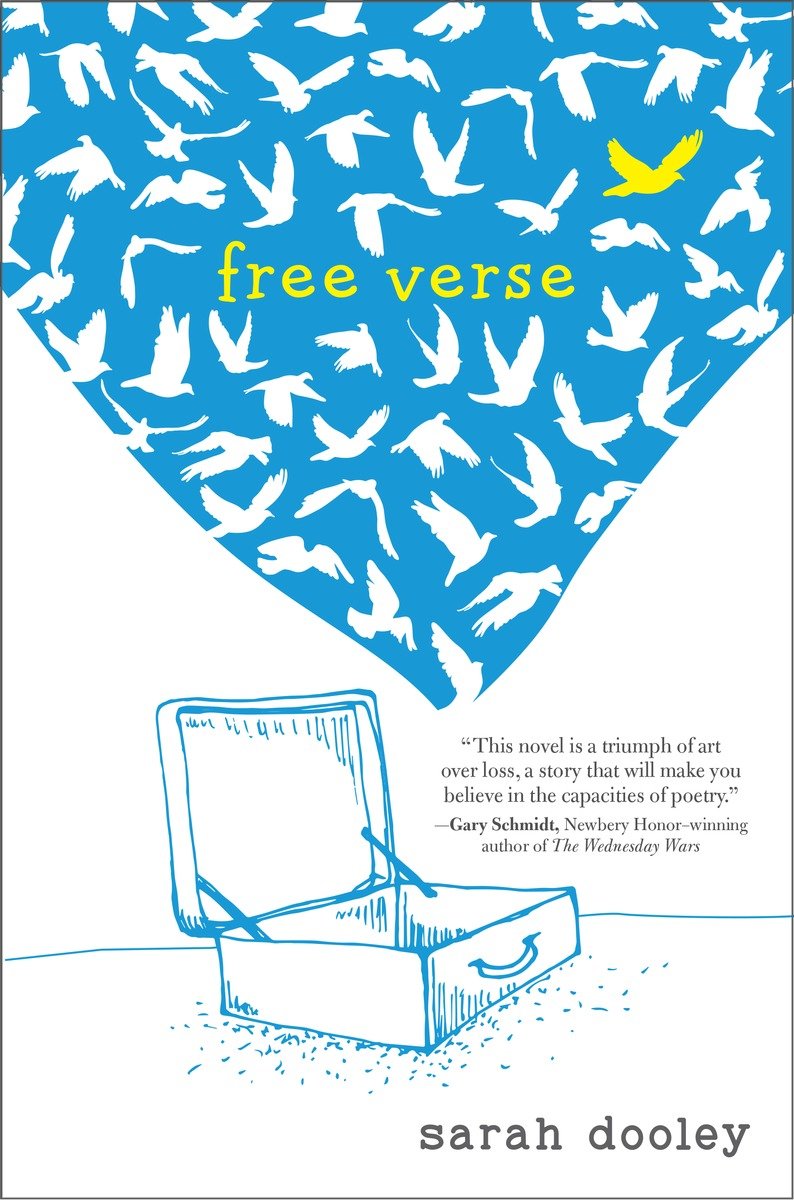
Free Verse
فرمت کتاب
ebook
تاریخ انتشار
2016
Lexile Score
740
Reading Level
3-4
ATOS
4.7
Interest Level
4-8(MG)
نویسنده
Sarah Dooleyشابک
9781101657256
کتاب های مرتبط
- اطلاعات
- نقد و بررسی
- دیدگاه کاربران
نقد و بررسی

Starred review from February 22, 2016
Dooley (Body of Water) brings to life the hardscrabble existence of residents in the fictional town of Caboose, W. Va., through the eyes of 12-year old Sasha, as she adjusts to living with her new foster mother, Phyllis. Sashaâs matter-of-fact narration belies her anguish at repeated losses: her motherâs disappearance and the deaths of her coalminer father and firefighter brother. Stressful events (Phyllis singing Sashaâs motherâs song, a school bullyâs teasing) trigger violent or disassociated responses, which Sasha canât remember (âThereâs this thing that happens sometimesâ) or which compel her to run away. While Sasha feels pressed to fulfill her brotherâs wish that she escape Caboose, her discovery of cousins next door presents her with the daunting awareness of more people to love (or to lose) and her power to make choices. A 60+ page section of Sashaâs poetry powerfully reveals how she uses poetic forms like haiku, quatrains, and epistles to express overwhelming feelings. In this gripping story, Dooley balances a clear-eyed depiction of families wrestling with addiction, financial stress, and trauma with the astonishing resilience of children and the human capacity for love. Ages 10âup. Agency: Laura Langlie Literary Agency.

December 15, 2015
A troubled teen discovers the therapeutic balm of verse. In a backwoods West Virginia mining town beset by poverty and environmental hazards, 13-year-old narrator Sasha Harless finds herself reeling from the loss of her guardian brother, Michael, whose recent death magnifies the sense of abandonment she first encountered at age 5, when her mother left them, and again at 8, after their father was killed in a mining accident. Michael's death places Sasha under the protection of a kindly foster mother, who attempts to provide stability, but Sasha suffers from anxiety and violent outbursts when overcome by disturbing emotions, especially when grief "blows through me like a cold wind, thundering for me to go, to get out, to move." Sasha acts out at school and runs away repeatedly, taking a beloved cousin with her once with sobering consequences. Sasha remains intent on leaving town until she's exposed to poetry in English class and begins to find "something about the shortness of haiku feels good." Dooley cleverly weaves into her novel different verse forms, which Sasha attempts for a poetry club she joins, giving her protagonist poet some creative focus, the freedom to experiment with self-expression, and the courage to stay put long enough to let the strength of her emotions settle inside. Dooley winningly combines engaging plot twists and rich character development with the introspective and thematic power of poetry: not to be missed. (Fiction. 10-14)
COPYRIGHT(2015) Kirkus Reviews, ALL RIGHTS RESERVED.

Starred review from February 1, 2016
Gr 5-7-The West Virginia coal mining town of Caboose seems to be to blame for the mounting losses of everyone Sasha loves. First her mother walks out and doesn't come back. Then her father dies in a mining accident. And finally her caretaker older brother Michael dies while fighting a fire. Angry and los t, the seventh grader initially shuts down everyone around her. Her journey through grief is made possible by a certain resilience of those around her and her willingness to see the neighbor kid Mikey, a distant relative, as a friend. That opening allows other friends to appear, and she soon joins a poetry club where she discovers the healing power of putting her feelings and ideas into words. Ostensibly motivated by a scholarship contest, Sasha is not really going to be immune to pain in the future, but she's finding a way to cope. The changes in her life, the anguish she feels, and her journey forward are expertly portrayed through Dooley's use of first-person narration, which is sensitive and gentle without being soft or sentimental. The poetry is wonderful and feels authentic to Sasha's years without being unduly adult. Various verse forms are explored, including haiku, cinquain, and quatrain. VERDICT What could have been a mushy tearjerker resonates with emotional authenticity in Dooley's deft hands; an excellent purchase for upper elementary and middle school collections.-Carol A. Edwards, Formerly at Denver Public Library, CO
Copyright 2016 School Library Journal, LLC Used with permission.

Starred review from January 1, 2016
Grades 5-8 *Starred Review* Five, seven, fivethe pattern of haikuis the combination for Sasha to open the door to her poetic self. The 13-year-old lives in Caboose, West Virginia, and if it wasn't for bad luck, she'd have no luck at all: her mother walked away, her father died in the mines, and her brother was killed in the line of fire, leaving foster mom Phyllis to do her best with egg-salad sandwiches served on the porch at four in the morning. Sasha, meanwhile, tries to manage her desperate life, but blackout rages keep setting her back. Thankfully, a school counselor, new friends, and a poetry club with an unlikely leader help Sasha begin a life with her next-door cousin, Mikey, and his dad, Hubert. Through the club and its contests, Dooley subtly exposes readers to poetic forms that invite engagement, understanding, and expression, while Sasha and her extended family are depicted with a sweetness reminiscent of Cynthia Rylanta southern soulfulness that is warm even as it reveals the downtrodden struggles of a mining community. With a lifetime goal of leaving Caboose behind, Sasha has to wonder why it is that we leave home when the only family we know is there.(Reprinted with permission of Booklist, copyright 2016, American Library Association.)

























دیدگاه کاربران